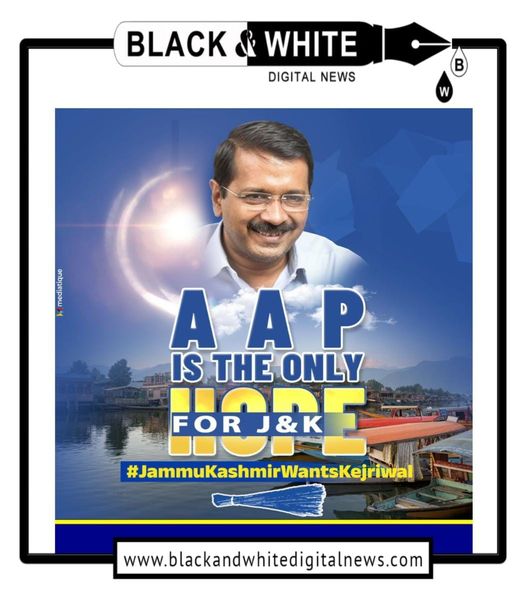Betrayed Dreams: AAP Leaves Jammu Leaders Disillusioned as Party Falters in J&K.
||Black and White Digital News||
||Tejveer Singh September 12, 2023||
JAMMU: In yet another wave of disillusionment, leaders of the Aam Aadmi Party (AAP) in Jammu find themselves abandoned and frustrated. The initial excitement surrounding the party’s entry into Jammu and Kashmir has fizzled out as AAP delays the announcement of candidates for the second and third phases of the upcoming assembly polls. Despite releasing a candidate list for the first phase, the subsequent silence has left many leaders in Jammu disheartened, further deepening the sense of betrayal.
A Grand Beginning, A Disheartening End:
When AAP was first launched in Jammu, it was with immense enthusiasm. A spacious office was opened in the posh Gandhi Nagar area, serving as a beacon of hope for political change. Prominent figures from various political parties—such as Taranjit Singh Tony, Yashpal Kundal, Balwant Singh Mankotia, Harshdev Singh, and Surinder Singh Shingari—joined the movement, with many businessmen and retired bureaucrats also pledging their support.
However, the lack of planning, coordination, and leadership soon led to the collapse of the Jammu chapter of AAP. The office closed, and leaders began parting ways as they sensed the diminishing momentum. Leaders like Taranjit Singh Tony, Balwant Singh Mankotia, Yashpal Kundal, and Harshdev Singh made a timely exit, choosing to contest elections under different party banners. Their decision to part ways from AAP has proven to be a wise one, given the current turmoil and abandonment within the party.
Those Who Remained: A Story of Loyalty and Betrayal:
While some leaders distanced themselves at the right time, a handful of loyalists remained hopeful. Surinder Singh Shingari, Jayesh Gupta, Amit Kapoor, O.P. Khajuria, and Deep Singh clung to the belief that AAP would actively participate in the upcoming Jammu and Kashmir assembly elections. Their hopes were buoyed by AAP leader Imran Hussain’s visit to Jammu, during which he confidently announced the party’s participation in the elections with great enthusiasm.
But with each passing day, their loyalty seems to have been met with disappointment. According to inside sources, AAP has shifted its focus elsewhere, particularly on Haryana elections and the legal challenges facing Arvind Kejriwal. Reports suggest that top AAP leaders have advised their Jammu cadre to contest as independent candidates, signaling the party’s lack of commitment to the region.
AAP’s Larger Shift in Focus:
The Aam Aadmi Party’s sudden shift in focus away from Jammu and Kashmir highlights a growing discontent among local leaders and cadres who had placed their faith in the party. A leader, choosing to remain anonymous, revealed that AAP has no concrete plans for Jammu and Kashmir at this stage, leaving those who hoped for change feeling once again betrayed.
This is not the first time AAP has shown a lack of commitment to Jammu and Kashmir. During previous elections, the party’s engagement in the region was erratic at best, with many leaders feeling sidelined. The same sense of neglect has resurfaced now, deepening the divide between Jammu’s political landscape and AAP’s central leadership.
Future Uncertain for AAP Leaders in Jammu:
With AAP’s leadership effectively abandoning its local leaders, the future for these individuals appears bleak. The delay in announcing candidates, coupled with the party’s shifting focus, has cast a shadow over their political prospects. Many of the leaders who stayed loyal to AAP, like Surinder Singh Shingari and Amit Kapoor, are left in a precarious situation, uncertain whether to continue their association with the party or seek alternatives in an already crowded political field.
The leaders who exited AAP early—such as Taranjit Singh Tony, Balwant Mankotia, and Harshdev Singh—seem to have made the right decision in distancing themselves from the party’s floundering Jammu chapter. Their early departure has allowed them to realign themselves politically, securing new platforms to contest elections and remain relevant in the political landscape of Jammu and Kashmir.
Conclusion: The Betrayal of a Dream:
The once-promising political experiment of AAP in Jammu has crumbled, leaving behind a trail of disillusionment and broken promises. The local leaders who stayed loyal to the party now face the daunting reality of contesting elections without the backing they were promised. Meanwhile, those who left AAP early have carved out new paths, recognizing the party’s failure to establish a foothold in Jammu and Kashmir.
As AAP shifts its attention elsewhere, the Jammu leaders are left grappling with the consequences of misplaced loyalty and broken dreams, a sad testament to the party’s failure to stay committed to its promises in the region.



